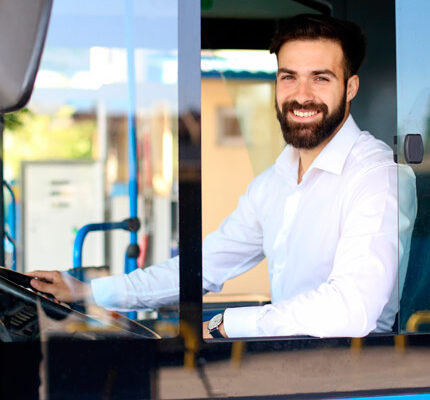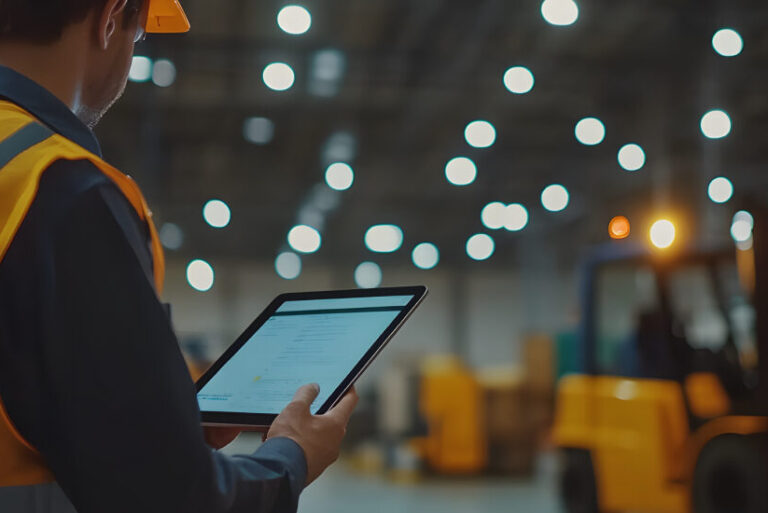California LCFS Program
Rebates for EV fleets through California’s Low Carbon Fuel Standard

Earning Rebates Through California’s Low Carbon Fuel Standard
The Low Carbon Fuel Standard (LCFS) is a regulation designed to reduce Greenhouse Gas (GHG) emissions from transportation fuels in California. The program assigns a “Carbon Intensity” (CI) score to each transportation fuel with the aim of reducing emissions by incentivizing clean energy
By opting into the LCFS program, electric vehicle (EV) fleet owners can earn energy rebate credits for each metric ton of carbon equivalent (MTCO2e) emissions avoided through the use of electricity-powered vehicles. Learn how you can take advantage.
Eligibility
EV fleet owners in California are voluntary LCFS participants who can earn additional revenue through energy credits.
Entities eligible for earning energy credits on reduced emissions include:
- Electric vehicle service providers (EVSP)
- Electric vehicle (EV) fleet operators, including buses and trucks
- Electric vehicle forklift fleet operators
What types of vehicles are eligible to earn LCFS credits?
The following types of electric vehicles are eligible to earn credits in California. If you’re unsure whether your vehicle qualifies, contact us today.
- Electric / Hydrogen Forklift Trucks GSE
- Battery-powered Material Handling Equipment (MHE)
- Electric Transportation Refrigeration Units (eTRUs)
- Electric Trucks - All Classes and Yard Tractors
- Electric Buses and Shuttles
Am I required to opt into the program?
Importers, producers, and refiners of fossil fuels in California are the only entities required to report their emissions.
What happens if I don’t opt in?
Voluntary participants, such as EV fleet owners, are not required to opt into the program. However, the rebates you would otherwise earn will go unclaimed.
If I only have one electric vehicle, am I still eligible?
Yes – businesses of any size in California are encouraged to enroll with Smart Rebates™. You’ll earn monetary rebates regardless of your fleet size.
Application
California-based EV fleet owners can apply to the LCFS with Smart Rebates™ at no out-of-pocket cost. We’ll take care of the application and enrollment process for you.
Our enrollment process includes a no-cost in-person site audit that ensures a comprehensive and accurate estimate of your rebate earnings. Unlike other credit aggregators that require you to fill out the information yourself, our on-site audits do all the paperwork for you and help you avoid the risk of misrepresented assets and resulting fines.

How can my company enroll in Smart Rebates™?
Companies interested in Smart Rebates™ must sign any CARB-required paperwork and opt into Smart Rebates™ by signing the Participation Agreement. Next, you’ll allow SCT or our service providers to survey your site to assess and collect your forklift truck, MHE, transportation fleet, and battery charger data. Once your company is deemed eligible for Smart Rebates™, you’re only required to provide us with quarterly changes to your fleet. Contact us to get started.
I’ve already enrolled in the LCFS program. Can I still switch to Smart Rebates™?
Yes. To get an estimate of your potential earnings with Smart Rebates™, we will perform an in-person audit to ensure your estimate is accurate and you’re getting the maximum value for your credits.
How long does the application process typically take?
When you enroll with Smart Rebates™ we’ll perform an on-site audit to estimate your earnings and will immediately begin the application process. You’ll receive your first check 45 days after the end of the first reporting quarter and every 90 days after that.
Reselling
Electric bus, truck, and forklift owners in California receive LCFS credits for every metric ton of CO2 equivalent (CO2e) emissions avoided. These are sold on the market to fuel producers that need to offset their own emissions. The energy credit market is based on supply-and-demand, so values of credits may vary.
Credit aggregators like Smart Rebates™ manage the trading process, ensuring you earn the highest reward for your aggregated LCFS credits. We have longstanding relationships with fuel producers in California required to offset their deficits by purchasing energy credits, enabling us to get our customers the highest prices for their credits.
What kind of rebates can I expect to earn on a quarterly basis?
The LCFS energy credit market is based on supply and demand, and varies with the type and quantity of EV equipment used. When you enroll with us, you’ll receive a no-cost on-site audit to get you an estimate of your quarterly earnings. Contact us to initiate the audit process.
How long can I expect to receive rebates?
The LCFS is currently planned to remain active until 2030; however, the program is expected to be extended to continue reducing California’s carbon emissions.
Rebates
Rebates are earned on a quarterly basis based on quantity and type of EVs, as well as on the supply-and-demand market of energy credit trading.
You’ll receive quarterly checks that reflect the value of your sold LCFS credits, which you can apply to any business expenses, including offsetting the cost of your EVs or buying additional vehicles to earn more credits.

What’s the catch?
There is no catch! The LCFS program is an effective tool designed to incentivize businesses to reduce their carbon emissions and award investments in cleaner technologies.
When can I expect my first rebate check?
You’ll receive your first check 45 days after the end of the first reporting quarter.
Reporting
Fleet owners that opt into the LCFS are subject to reporting and record-keeping requirements every quarter. Fleet owners that opt into the program must submit quarterly and annual reports that must be uploaded and submitted to the LRT-CBTS by the following quarterly deadlines:
- June 30th – for the first calendar quarter covering January through March
- September 30th – for the second calendar quarter covering April through June
- December 31st – for the third calendar quarter covering July through September
- March 31st – for the fourth calendar quarter covering October through December
Meeting these deadlines can be time-intensive and subject to fines in the event of a misreport. By enrolling with Smart Rebates™, you don’t have to worry about missing important reporting deadlines – we’ll take care of that for you at no out-of-pocket cost.
What type of data is being collected and reported to CARB?
Smart Rebates™ only requires your company to provide SCT or our service providers with access to your site and equipment usage data.
What happens if my site changes or if I purchase new EVs?
We’ll perform a no-cost in-person audit to alleviate the burden and compliance risks associated with reporting by accurately capturing relevant site and equipment usage.
What happens if I report inaccurate data?
Inaccurate reporting may result in fines from CARB. Our in-person audit helps you avoid the risks associated with self-reporting.
Get More Information
What to Expect
When you enroll in Smart Rebates™, we’ll perform an in-person audit to give you an estimate of your earnings and ensure accurate reporting. We’ll handle the application, reselling, and reporting processes at no cost to you.
As a fleet owner, you’ll be able to earn additional revenue from your EVs, at no cost and with no risk of fines or inaccurate data readings. Learn more about Smart Rebates™ for EV fleet owners.
Recent Updates in California
Smart Charging Technologies Launches Smart Telemetrics Dashboard: A New Era of Simplicity in Motive Power Fleet Visibility - Orlando, FL – 4/15/25 — Smart Charging Technologies (SCT) is proud to announce the official launch of its… Read more >
Smart Charging Technologies to Unveil the Next Generation of Telematics System Solutions at ProMat 2025 - Smart Charging Technologies (SCT) is redefining motive power fleet telematics with cellular-powered tracking and monitoring solutions designed for… Read more >
Maximizing Uptime on a Budget: Compete with Industry Leaders - When you think of industry giants managing sprawling fleets with ease, it’s hard not to feel a bit… Read more >



